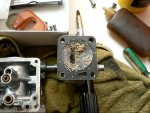What was saying is that higher octane fuels have better fuel additives compared to less octane fuels. We sell Tohatsu outboards, a experiment was conducted 2 years ago. 2-2 stroke 30 HP engines were used on 2 same boats, one with 90 octane fuel, the other with 95 octane fuel, both fuels Non E fuels. After 1K metered worked hours both engine were stripped down to have a cylinder head gasket change along cleaning all water circuits + decarbon combustion chamber. The one using 95 octane had 50% less carbon buidup compared to the one using 90 octane, no extra additives were added to any of both fuels.
Don`t need or have any advantage using higher octane fuels to run outboards, 90 octane will suffice, but there?s something added to higher octane fuel that maintains combustion chambers cleaner besides engine running smoother. Can feel it on the throttle response.
Going back to E, although you can remedy E issues on fuel pumps diphragams by using neoprene, gviton or nitrile. Most diaphragams are not commercialy available in such materials, unless you make them yourself. I?m not a big fan changing parts as a preventive maintenance, but if using E fuels, if you remove fuel pumps diaphragams as to clean the pump interior, the diaphragam will not fit nicely once removed, will be warped, even the holes won't match against pump body. Check these pics to corroborate what I?m talking about...



Bottomline, if you have non E fuels available in your location, use them, engine?s internal o?rings, diaphragm, lines that deals with fuel will last for years to come...
Happy Boating

























